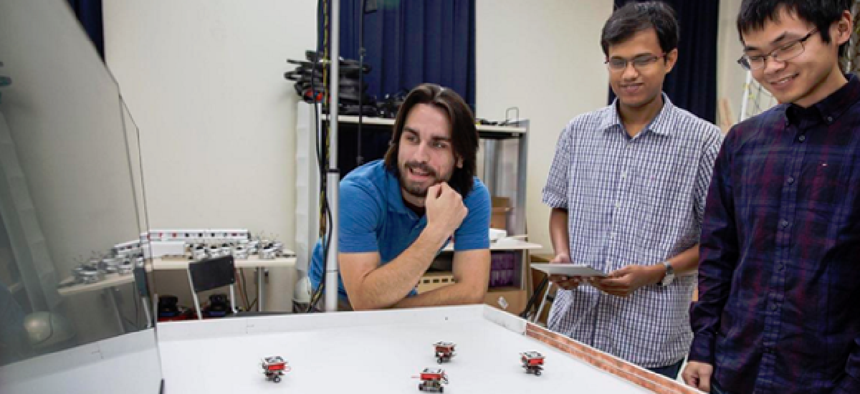Georgia Tech offers a robotics co-op to researchers


Connecting state and local government leaders
The Robotarium would give researchers remote access to expensive equipment on which to test swarm robotics software.
In academia, researchers often hold their work close to the vest until formal publication and, perhaps, the filing of a patent application. So Magnus Egerstedt may be facing an uphill battle with his effort to create a robotics co-op where researchers can remotely test their software for controlling robots. But he is convinced his new Robotarium could spur big advances in robotics.
“If it goes the way I'm hoping, it has the potential to make us way more effective as a community,” said Egerstedt, a professor at the School of Electrical and Computer Engineering at the Georgia Institute of Technology. “As long as people buy into the model, it has the potential to go big.”
Egerstedt’s idea, which has received $2.5 million in funding from the National Science Foundation, is to build a lab with up to 100 ground and aerial swarm robots and give researchers at other universities, as well as to middle- and high-school students, remote access. After scheduling a time slot for their experiments, researchers will upload their code to the lab, then watch the results on streaming video.
Egerstedt came up with the idea about two years ago when he noticed how much costly equipment he had in his lab. “I clocked in somewhere around a half a million,” he said. “That bothered me a little bit.”
What bothered Egerstedt was the realization that most of the work in swarm robotics was restricted to a handful of well-endowed institutions. “It became clear that it is largely a resource competition as opposed to a good ideas competition,” he said. “I set out to solve that.”
The Robotarium is currently open for business -- though initially with only a limited set of wheeled swarm robots.
“We are kind of early on,” Egerstedt said. “There is an alpha version where you go online and you upload your controllers. We have some specs up.”
For the present, the site’s homepage only allows users to request access. “One of the things we're a little nervous at is that we are literally giving people access to physical assets on the Georgia Tech campus,” Egerstedt said.
In addition to working out security, another hurdle Egerstedt faces is convincing researchers at other universities to share their work through the Robotarium.
“In robotics today … everyone is doing their research in isolation,” Egerstedt said. “We don't build on each other's work as much as we should.” He added that the lab will timestamp uploads, which should provide some protection for researchers’ contributions.
And the upside for contributors, according to Egerstedt, is that contributions to the lab -- whether in the form of code, a new sensor other hardware -- will be tested by thousands of scientists.
Egerstedt said he hopes that the model of sharing lab resources extends beyond this effort, changing more than just swarm robotics research. “It could be a blueprint for how we think about research infrastructure,” he said. “To be honest, we are wasting a lot of resources replicating the same lab. We making the barriers to entry too large and we are slowing down innovation.”
The Robotarium is expected to be fully operational in 2017.




